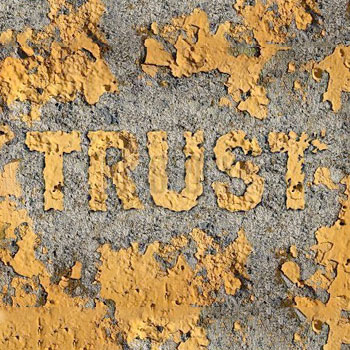By Judith E. Glaser | huffingtonpost.com
Published: June 17, 2014

Most of us would acknowledge that building trust is a key part of our lives. We may even think we know how to size up whether to trust someone at that moment of contact when we first meet, or perhaps in whom we choose to hire or work with.
But, if everyone thinks along similar lines, why does it always seem like no one trusts each other? In 75 percent of companies surveyed, employees don't trust their bosses, bosses don't trust their employees and when it comes down to it, your customers don't seem to trust any of you.
Fortunately, it doesn't have to be this way. We can create healthy environments where trust is the currency and success is the outcome.
At the Moment of Contact
The decision to trust or distrust someone takes just a moment. That moment -- whether it be a handshake, a telephone call or an email -- locks in a relationship trajectory that may last for weeks, months or even possibly a lifetime. Our brains, having evolved over millions of years, are conditioned to make snap judgments in identifying our friends and foes -- those people that we trust to act in our best interest as opposed to those that seek to take advantage of us.
It's vital to begin building trust once we understand it. Trust begins and maintains a relationship, while distrust in some cases ends it. For simplicity's sake, let's define what I mean by trust and distrust.
Trust looks like this:
I trust that you and I share the same view of reality. I trust that you will have my best interests at heart (you care about me); that you will not cause me to fear you; you will allow me to speak my voice without fear of retribution so I can be open and candid with you and share everything that's on my mind. (You demonstrate that you are my friend, not my foe.)
Distrust looks like this:
You and I see the world very differently. We disagree on what's important. I feel you have your own interests at heart and could care less about mine. You talk out of two sides of your mouth--one to me, and another to your closest buddies. I am afraid to share what's on my mind for fear you'll use it against me. (In truth, you act like a foe, not a friend.)
Opening or Closing Our Minds
It is essential to recognize how trust and distrust drive so many of our personal interactions and relationships. To understand them in a different way, consider the simple analogy of a door that guards the pathway to our inner self. When we feel trust, we readily open that door, leading to an exchange of thoughts, feelings and dreams with someone else. When we distrust someone, thinking that he or she is somehow a threat, you can bet we will slam our door as quickly as possible as we begin to defend ourselves.
Unfortunately, our brains don't always make the best judgments relative to our long-term interests when it comes to deciding which door: Our neural programming is designed to make split second decisions right now, not consider the consequences down the road. That's why, especially in times of stress as we see in so many workplaces these days, we can find doors slamming left and right.
Unintended Consequences
The downside of making snap decisions is that we might be misinterpreting the signals we're receiving from our bosses and co-workers, leading us to mislabel friends as foes. Perhaps we have trusted someone in the past, only to have that person stab us in the back. (Just ask any of Bernard Madoff's investors about that dilemma.) We might even be unknowingly sending out signals of our own, causing others to distrust us even when we think we have the other person's best interests at heart.
Conversational Intelligence™ Neuro-tip #1: Our brain responds to signals of threat in .07 seconds. The response is chemical; we don't have conscious control over the speed or the response; it's instinctual. Fear triggers the primitive brain -- called the Amygdala -- and activates a neurotransmitter called cortisol, which closes down our Prefrontal Cortex (also called our Executive Brain), where truth, judgment and trust reside.








